Series 7 - listen to the show
The Binary Times - Series 7 Episode 12a
Sun 21 June, 2020
Timeline companion

00:27 Wayne welcomes us to the final episode of Series 7. It's windy, sunny and rainey in Bristol, a bit of a mixed bag in Kilkishen with heavy rain on the way and it's a beautiful sunny day in Dublin from whence Ben joins us. The guys discuss the weather for a bit before delving into the topic for the show, that being the ethics of the Binary Times, the individuals behind it and what they try to do implement those ethics in their daily and work lives.
The guys kick off their conversation around the small topic of Free Culture. Wayne quotes the FSFE's statement on what is Free Software. Mark has a little rant about proprietary software and licenses generating wealth for the few. Ben brings it back with a little devil advocacy. Services are key to free and open source software strategy. Ben brings up the topic of open core software.
The conversation moves onto screwdrivers and printing in linux and hardware in general. Mark mentions Unauthorized Bread as a good read on the subject of licensed appliances and Ben agrees, while also talking about Martin Wimpress' latest male grooming products.
30:10 Wayne moves the conversation around to free phones. Mark's optimistic about the future. He also tells he's using a BQ E4.5 with Ubuntu Touch. He also tell us about his experince with /e/. Ben's not using Ubuntu Touch because of the lack of integration with NextCloud. Wayne tells us that NextCloud integration is on the way but that the Ubuntu Touch developers are stretched. Ben tells us he has recently purchased a Fairphone 3 from /e/ and gets a warm feeling inside using his phone with nextcloud integration. Ben also tells us of Fairphone's long life strategy and how the Fairphone 2 has recently been updated to Android 9. The guys go on to talk about how they came to Linux and Free Software. Ben recommends Hackers by Steven Levy. Wayne isn't overly happy about working with proprietary software but then advocating for Free Software. Mark reminds us of The Open Source Community on Steam, advocating for Free Software on a proprietary platform. Wayne's still not convinced and thinks he'll end up on MikeOS. Ben reminds us of Collapse OS, an Operating System and collection of tools designed to soften the fall of civilization. The guys talk about the effects of the current crisis on everything. Wayne tells us he's using UBPorts on a Sony Xperia X.
1:08:45 Under the Hood - Mark tells us to put in youtube.com. instead of youtube.com to remove ads from Youtube. Ben tells us he's using NovaLauncher on his Fairphone. Wayne encourages people to check out UBPorts device list to see if your phone is supported. He also says to check out f-droid if you're going to stick with Android. Ben is optimistic about the future of free software phones.
1:14:20 Irish Saying of the show - it's a special episode so we get two sayings! 'Saoirse Boegearraí' means Software Freedom and 'Cultúr Saor in Aisce' Free Culture.
We hope you enjoy the show as much as we did making it!
The Binary Times - Series 7 Episode 12
Sun 9 June, 2020
Timeline companion
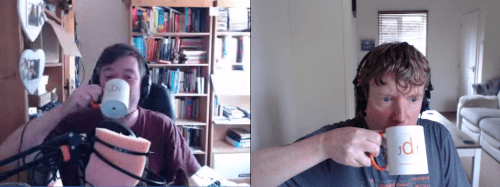
00:24 Wayne welcomes us to Season 7 Episode 12 from a slightly windy, spitty rainy kinda Bristol. Wayne's not getting what he wants, but Mark reminds us we get what we need, from an overcast, but with no rain yet Kilkishen.
02:57 The conversation turns towards what's been keeping the lads busy. Mark tells us that not only has he built a Lego International Space Station, which he is hopefully going to be talking about on Maker's Corner, another show from the Otherside Network.
Mark goes on to tell us about his amazing adventures in rebooting his server setup. He thought of FreeNAS but the minumum requirements of 8GB RAM led him to consider btrfs instead. A presentation by Marc Merlin helped Mark decide on btrfs. Mark installed OpenSUSE Leap 15.1 on the 60GB SSD using the default btrfs and subvolumes for the root partition, and then used the RAID 1 feature provided by btrs for both data and metadata on the two large drives and mounted them seperately as data storage. Mark praises the OpenSUSE documentation, particularly the Reference Guide and the Storage Administrators Book. Mark also praises the btrfs wiki, Arch wiki and also the Gentoo wiki. Wayne mentions the article that Mark shared about Kubuntu considering Hugo to generate their web site.
23:30 Wayne tells us about some recent wireless support issues he was involved in.
28:13 Wayne goes on to tell us about the internet doorbell he built, Telegram bot and all. He was encouraged to do this thanks to goading from Mark.
32:16 Wayne tells us he's gone back to Head First Python. This prompts a discussion around programming in general, python in particular and even a linux distribution with a Python Userspace. Wayne recommends simplicity when starting, and suggests using Thonny rather than Pycharm as an easy to use Integrated Development Environment. The guys discuss whether you need an IDE at all.
Wayne swings the conversation around to problems he's having with Atril and his search for a suitable replacement. Foliate has been working out well so far. Mark gives out about some program he can't remember the name of. The guys hint at what's going to be on the special for this season.
48:02 Under the Hood - Mark recommends listeners check out Cosplay Like a Pro and Get Certified by Packt.
Wayne's first Under the Hood is to use the middle button to past text that has already been selected for copying. His second is an interesting utility called Bashtop, a resource monitor that shows usage and stats for processor, memory, disks, network and processes.
Irish Saying of the show is "an coinín bán", or the white rabbit.
We hope you enjoy this show as much as we did making it.
The Binary Times - Series 7 Episode 11
Sun 24 May, 2020
Timeline companion
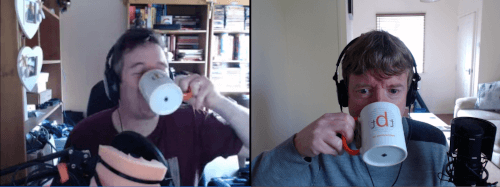
00:27 After a few technical glitches, Wayne finally welcomes us to yet another episode of the Binary Times, this particular episode being the 11th of Season 7. The weather outside isn't great, windy, sunny, rainy, cloudy, all rolled into one. Mark questions whether wittr.in is really reflective of the weather.
02:40 Mark tells us he's spun up a Pi-Hole Version 5 on a Raspberry Pi 2. He also tells us about Alan Pope's Raspberry Pi Imager application, which makes spinning up a Raspberry Pi OS even easier. Wayne tells us about how cool LibreElec and Kodi are. Mark agrees and goes on to tell us about his server misadventures. The takeaway is be careful the keystrokes you choose when waking a monitor from sleep! Mark then talks about installing Windows 10 to do a course and says the experience is much better than he remembers it (well done Microsoft), before telling us that he reckons he's going to install OpenSuse Leap with btrfs on his server. The guys discuss FreeNAS as an alternative and Lawrence Systems youtube videos for FreeNAS advice.
Mark goes on to question the value of certification, which kicks off a bit of a conversation around certification, training, education and life in general.
27:21 In the spirit of collaboration, Wayne thanks Robert for his recent help and tells us his own server tale.
28:55 Wayne brings up a recent conversation the guys had with Glady, a long term supporter of the show. She was looking for backup alternatives and Wayne recommended rsync as a good choice, also recommending the documents "How to Use rsync Command to Copy Files on Ubuntu", "How to Use rsync with Examples" and the "Non-Beginner's Guide to Syncing Data with Rsync", as well as the man pages of course. Mark also recommends explainshell.com.
31:41 Wayne discusses an email we received from Willi in Germany and his fork of a little bit of software for timeshift that takes a snapshot every time you run any APT operation on debian systems, as well as a very detailed guide with videos about how to install luks encrypted btrfs on Ubuntu, PopOS and Manjaro. The chat moves onto file systems and backups and Wayne mention a particular video on FreeNAS from Lawrence Systems as useful.
38:34 Wayne brings the conversation around to running an IT business during COVID and the guys discuss how to do it.
43:14 Wayne talks about Nextcloud Talk and specifically the benefits of Talk 9.
46:06 Mark thanks Paul Clyne for his generosity in providing another laptop
47:22 Under the Hood - Wayne kicks this one off with a mention of the Learn you some Python Humble Bundle from No Starch Press. Wayne goes on to tell us about an article on the Magpi Magazine which shows how to make a Sense HAT rainbow window display. Wayne's major under is hold down the CTRL and F5 keys together in Firefox to refresh the page and clear the cache. The guys mention Glady's tip of the OneTab extension, an extension that converts tabs to a list to reduce memory use.
Mark's Under the Hood is this: in nautilus, click on other locations, then in the connect to server field, type "admin:///" and voila! after you've put in your password, you're in superuser mode! In caja, just right click and open as administrator. In dolphin, just right click, open with, and file manager as super user.
55:41 Irish Saying of the show is "An labhraíonn tú Gaeilge.?" or do you speak Irish.
We hope you enjoy this episode as much as we did making it!
The Binary Times - Series 7 Episode 10
Sun 10 May, 2020
Timeline companion
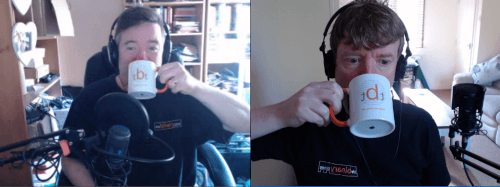
00:24 Wayne welcomes us to Series 07 Episode 10 of the Binary Times. It's warming up in Bristol. Mark tells us he and his family went for a darkness into light walk this morning. At the time it was foggy, then sunny, and now foggy again. Mark mentions knowing the feeling of Paul Dellegatto's dog Brody interrupting the weather forecasting. Mark tells us he loves living in Kilkishen.
04:46 Mark tells us he's been carrying on his quest to find the best new-comer distribution. He takes his hat off to the Ubuntu family of distributions. While he was seriously considering Kubuntu 20.04, especially considering Ubuntu Studio is moving to KDE, he's settled on Ubuntu-MATE 20.04 with the Cupertino panel.
Mark goes on to tell us that he's installed FreeBSD on his "studio PC". He plans to install the Lumina Desktop on top of Xorg. He wanted to brush up on his vim by running through the vim-tutor again, to do that on Ubuntu you need to install both vim-runtime and vim-gui-common. The guys go on to discuss vim and the likes of vifm and ranger. The conversation moves on to managing files in One Drive and Mark's credibility.
22:15 Wayne tells us about the fun he had upgrading to Ubuntu MATE 20.04. It didn't go well because it messed up his audio installation. There are also a number of steps Wayne needs to make to get MATE to how he likes it. First off he installs dconf-editor and ensures that the show-date option is on and that hide window thumbnails is selected. Wayne also tells us that his Timeshift backup didn't work, which led Wayne to just Nuke and Pave back to 18.04. Once this was done, he reduced the size of the icons on the desktop, and got rid of the 'Menu' word next to the MATE icon by going into gsettings and setting com.solus-project.brisk-menu label-visible to false. The guys discuss hi-DPI and then discuss Bill Hicks view on marketers and other matters. There's one slight thing left that he hasn't been able to fix and that is his guitarix plugins. This leads Wayne to talk about all his IT having niggling problems. Mark mentions Goran Mekić's IT feels like a constant Failure blog post, which he came across while looking up FreeBSD as a DAW. Wayne talks about software development complexity, before contemplating life away from a screen. This leads Mark to mention that he is getting the Lego ISS set. Wayne's conclusion to the whole thing is he loves IT apart from the niggles.
Wayne goes on to tell us about two Libreplanet talks that stood out for him. The first is the keynote by FSF executive director John Sullivan on our current crisis in communication freedom. The second was Rented future: The dangerous rise of life as a service by Lucy Ingham, in which she discusses how we are entering a post ownership age and the dangers and opportunities life as a service presents. Wayne also metions Dave's contribution to the chat with regard to the FSF's guide to free telecommunications. He goes on to tell us that he's also started looking into Vagrant and Ansible. Mark mentions that the AdminAdmin podcast is now part of the Otherside Network.
50:44 Under the Hood - Wayne kicks off his Under the Hood by recommending the two Libreplanet talks he spoke about and also recommending the Definitive Guides to all things Programming by O'Reilly bundle from Humble Bundle, which leads to a discussion about SQL databases and dBase III Plus.
Wayne's final under the hood is the Witty Pi 3, a HAT to provide a real time clock and power management for the Raspberry Pi.
For Mark's Under the Hood he mentions that there are a number of articles on the Industrial Ethernet Book of interest this month, being How Industrial Linux enables distributed IIoT applications, 5G in Manufacturing Will Reach $10.8 Billion by 2030, International IEC 63171-6 standard for Single Pair Ethernet and Industrial 5G technology offers potential wireless standard.
57:47 Irish Saying of the show is "Lá breá inniu" or it's a fine day today.
We hope you enjoy the show as much as we did making it!
The Binary Times - Series 7 Episode 9
Sun 26 Apr, 2020
Timeline companion
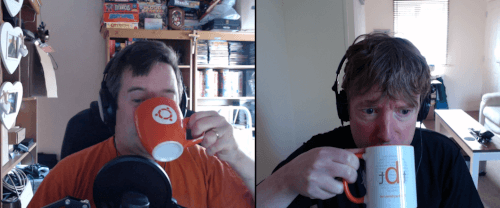
00:25 Wayne welcomes us to Series 7 Episode 9 from a clear skied Bristol, with nice temperatures through the day but getting chilly through the night. Mark gives us his weather report by clicking on his message tray on his new and shiny Ubuntu 20.04 Gnome desktop, which prompts a conversation around Ubuntu's most recent release. Mark recommends Wayne should upgrade to Ubuntu-MATE 20.04 having read its release notes and talks about his growing appreciation of the Gnome desktop. Wayne is slow to upgrade due to the extensive audio modifications he has made to his system. Mark isn't sure about snaps on laptops due to their autorefresh feature and the performance hit that can introduce. Mark tells us he's currently distro-hopping, trying to find the perfect distro for new users, and tells us a bit about Zorin OS. Wayne talks about the price of webcams.
16:39 The guys discuss the recent press release for Ubuntu 20.04 which they find interesting while bringing up many questions.
42:27 Wayne tells us about his follow up on the Russian hack attacks. Thanks to Robert for all his advice. He reads out Robert's email:
"Hello Wayne and Mark,
I'm just getting in touch to say that you got at least one listener. I always enjoy hearing about your trials and tribulations.
Re the school seeing lots of traffic from Russia, I suspect they are simply trying to either compromise the Wordpress install or already have found their way in. I work for a hosting company and I see this stuff a lot.
When a site is under I attack I usually run a few command to figure out what is going on. This will product a sorted count of IP addresses that hit the server in the last few minutes (assuming the current time is 10:30:
# grep "13/Apr/2020:10:2" /path/to/log | awk '{print $1}' | sort
| uniq -c | sort -hr
You can then get the top IP address and check what it's doing:
# grep "13/Apr/2020:10:2" /path/to/log | grep 1.2.3.4 | less
It's worth checking if the requests are mainly POST requests. They could simply be hits on wp-login.php or xmlrpc.co.uk:
# grep "13/Apr/2020:10:2" /path/to/log | grep 1.2.3.4 | grep -c POST
# grep "13/Apr/2020:10:2" /path/to/log | grep 1.2.3.4 | grep -c GET
Of course, also look at the resources (URLs) that are requested. It may be that they are creating user accounts or posting comments. Or if you see SQL commands in the resources they will be scanning for SQL vulnerabilities.
Also, investigate the server load. They might be mining crypto currencies (quite popular nowadays).
At work we're using this script quite a bit:
https://gitlab.com/beepmode/blockbot.
It may help find naughty IPs and figure out what they're doing, but blocking IPs unfortunately requires cPanel (or more specifically, CSF). It shouldn't actually be too difficult to use firewalld or iptables instead (the blocking is done on lines 836-845).
As a thought of the day, it might be worth switching the site from AWS to more traditional, managed hosting. I run a few of my own websites on a Digital Ocean VPS, mainly because it's cheap and because none of the sites are very important. For anything critical I would never choose unmanaged hosting. It's just too painful to deal with issues like spikes in traffic from Russian (and China).
Anyway, that's enough from me. Best wishes from a partially cloudy and slightly windy Norwich.
Robert"
Wayne goes on to tell us that he's moved the site to another server, upgraded all the bits and so far things are looking good. He also discusses how the Wordpress site was initially implemented over an existing static site.
Wayne tells us that he's installed Windows 10 in a Virtual Machine and an Ubuntu MATE Virtual Machine on an Ubuntu Server so that his partner can use Windows applications on her laptop. He used the following links to help him achieve this:
https://www.linuxtechi.com/install-configure-kvm-ubuntu-18-04-server/
https://fabianlee.org/2019/04/01/kvm-creating-a-bridged-network-with-netplan-on-ubuntu-bionic/
https://www.server-world.info/en/note?os=Ubuntu_18.04&p=kvm&f=4
https://docs.microsoft.com/en-gb/windows/win32/power/system-power-states?redirectedfrom=MSDN
https://linoxide.com/linux-how-to/xrdp-connect-ubuntu-linux-remote-desktop-via-rdp-from-windows/
https://learnubuntumate.weebly.com/enter-password-to-unlock.html
https://catch22cats.blogspot.com/2018/05/xrdp-creates-strange-directory-called.html
Wayne is still trying to figure out Wake On LAN.
Mark points out the environmental benefits of Wake On LAN, and mentions the momentous events in the last few days, being Earth Day, Ubuntu 20.04 release and the Hubble Telescope launch 30 years ago.
01:00:51 Under the Hood - Mark's under the hood is OMG Ubuntu's 10 things to do after installing Ubuntu (as well as 4 things you shouldn't do). He also mentions Building Ireland, Episode 2 The Transatlantic Telegraph Cable as well worth a watch. It was the inspiration that led to Mark redesigning his workspace! Mark is going to take a picture from the Other Side...
Wayne's under the hood is grep -rnw '/var/www/html/' -e 'upload_max_filesize',
where-r = recursive, -n = line number, -w = match whole word, -e = search pattern
01:05:46 Irish Saying of the show is "Tá gach rud agam", or I have everything! We hope you enjoy the show as much as we did making it.
The Binary Times - Series 7 Episode 8
Sun 12 Apr, 2020
Timeline companion
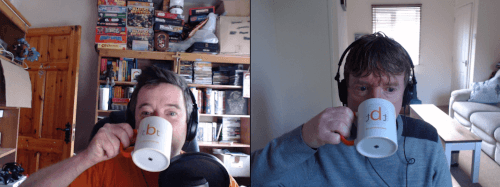
00:25 Wayne welcomes us to Series 7 Episode 8 from a glorious sunny Bristol, while Mark struggles to get wttr.in up in time to tell us what the weather is like. The fog in Kilkishen matches the fog in his mind, though overall the weather's been nice and looks like it'll improve from here on in.The guys chat about compost before Mark decides to tell a joke: What kind of tea is a web designers favourite type of tea? URL Grey! Oh, the fun we have! :)
04:50 Mark tells us about his latest adventures with Endless OS. Unfortunately the initial shine has worn off and he's found enough problems with it to make him cautious of using it for introducing new users to linux.
11:23 Mark tells us he's switched his search engine to Ecosia, a search engine that is using the profits it makes from your searches to plant trees. Ecosia uses Microsoft's Bing search functionality enhanced by its own algorithms to obtain its search results. The guys continue to discuss the benefits of planting trees and the possibility of planting trees in the Sahara and what implications that has for other ecologies. This leads the discussion around to how to fix things without breaking other things and being too ready to jump onto quick fix solutions. They also discuss how the current crisis has done more for climate change than anything governments have been able to do and they discuss how different governments have reacted to the crisis.The guys agree that it's important not to go back to selfishly accumulating under the old system. We need a shake up. The economy should serve humanity, not the other way around. The conversation moves onto how the media manipulates our thoughts.
25:02 The conversation finally returns to a bit of Linux. Wayne thanks Paul for the gift of the SSDs. Wayne's used one of these SSDs with his Dell Vostro to install Rosetta@Home, inspired by Use a Raspberry Pi to Fight Covid-19 with Rosetta@Home. First he installed Ubuntu Server, updated his system using sudo apt update && sudo apt upgrade and then installed the BOINC client by inputting sudo apt install boinc-client boinctui. This is now being used to help in the fight against the Corona Virus and Wayne thoroughly recommends it.
Wayne goes on to tell us that his company website is being DDoS'd and he discusses the methods he has used so far to fight these fiends. Mark and Wayne wonder about humanity.
Wayne has put together an audio studio on a laptop and SSD donated by Paul based on a video from Unfa, called How do I prepare Manjaro KDE for audio production?. In this video, Unfa goes through the steps he takes to make a great audio studio. The first step he takes is to run Timeshift and create a system backup. On Manjaro, you must first install Timeshift by inputting sudo pacman -Sy && sudo pacman -S timeshift, then run timeshift to create backups as new software is installed. JACK needs to be installed and this can be accomplished by typing into your terminal (hit F12 to bring one up quickly) which jackd followed by sudo pacman -S jack2. Then install Cadence by typing sudo pacman -S cadence. Ensure that your user is allowed to use Realtime Scheduling in the system by inputting the following:
groups
sudo usermod -a -G
sudo vi /etc/security/limits.conf
Add the following lines to the bottom of this file
@audio - rtprio 95
@audio - memlock unlimited
:wq
Reboot the machine and install octopi, a graphical frontend for pacman, a handy gui tool to install software. Open octopi, search for Ardour, right click 'Install', and add extra packages. Click on the 'Correct Mark' to install.
Click on the Alien Head icon in Octopi (to search the AUR) and install Zyn-Fusion.
yay --noconfirm --noeditmenu -S --aur aur/zyn-fusion aur/surge-synthesizer-bin
Unfa's favourite plugins: [available in the Arch repository (pacman)]
calf, lsp-plugins, fluidsynth, a2jmidid, ardour, audacity, aubio, cadence, calf, caps, carla, dragonfly reverb, drumgizmo, ebumeter, eq10q, geonkick, guitarix, helm-synth, liquidsfz, lsp-plugins, ninjas2, noise-repellent, qmidiarp, samplv1, setbfree, sherlock.lv2, sonic-visualiser, swh-plugins, tap-plugins, vamp-plugins, wolf-shaper, wolf-spectrum, x42-plugins, zam-plugins, zita-ajbridge, zita-njbridge, zita-rev1
AUR - bitrot, nvada plugins.
Finally, press the super key, type kernel, this opens the kernel app.
Select a real time kernel to use and click install. Reboot the machine, press the SHIFT key after the bios screen and you get to GRUB menu. Go to Advanced and select the RealTime Kernel you just installed.
Every time you boot the machine it'll automatically select the RT Kernel.
If you are to do this on a Debian based system you would need to enable the KXStudio repositories as detailed on the KXStudio website.
43:42 Wayne talks about installing Manjaro on the Pinebook Pro, since Pine are now installing it by default. Wayne finds it to be a pleasant community project that you need to be into to really enjoy the experience.
47:11 Under the Hood! Mark's under the hoods are Curious Journey - The 1916 Easter Rising by Kenneth Griffith, in which he interviews survivors of the 1916 Rising in an attempt to answer the Irish Question. Mark's second under the Hood is Blúiníní Béaloidis, an Irish Folklore podcast, with Episode 24 being all about folk medicine.
Wayne's under the hoods are a recommendation to update the zoom app. Mark mentions the Mozilla blog on Zoom. Wayne goes on to tell us that it is possible to use Ubuntu Touch as your daily driver.
53:32 Irish Saying of the show is "Tóg sos dom", or give me a break! We hope you enjoy the show as much as we did making it.
The Binary Times - Series 7 Episode 7
Sun 29 Mar, 2020
Timeline companion
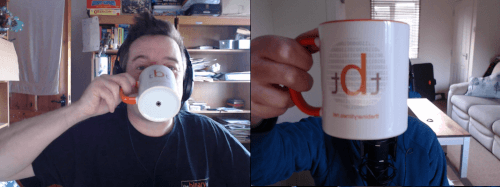
00:25 Wayne welcomes us to Series 7 Episode 7 from a bright but windy and chilly Bristol. Mark tells us it's sunny in Kilkishen and complains about changing the clocks for summer time. The guys discuss the possibility that summertime may end in Europe and the confusion that may cause them being in different time zones. Mark mentions Swatch Internet time.
05:15 Mark and Wayne talk about Endless OS.
17:16 Wayne tells us how he's been swamped recently with his organization's sudden move to online working. Unfortunately Nextcloud didn't work out as he hoped, as Office 365 is already embedded in the organization.The guys also talk about Private, Public and Hybrid clouds, before switching their attention to Zoom, which everyone seems to be using without considering the security of the application, while the Electronic Frontier Foundation has compiled a list of its privacy issues. The conversation moves onto to Microsoft Teams, Skype and Jitsi before the guys change the subject to mobile vs. desktop computing, the expectations that they should be the same, and advise people to not give thanks when it's not deserved. Also, in your own self interest, don't touch the guys' screens!
36:12 Wayne talks about audio in Linux and recommends Alsamixer as a useful command line tool for setting audio levels. He also suggests a desk arm is vital to good sound quality, and the positioning of the microphone is important.
42:10 Under the Hood - Wayne's recent one that he came across recently is Fast.com, Netflix's speed testing tool. He also mentions a humble bundle collection, the Coding Starter Kit bundle by No Starch Press. Wayne recommends CTRL X followed by CTRL E from bash to allow for multiline editing.
Mark's under the hood is Build this 8-Bit Home Computer With Just 5 Chips
51:05 Irish saying of the Show is "Tá alann páipéar leithris ar Marc" or Mark has all the toilet paper.
We hope you enjoy the show as much as we did making it!
The Binary Times - Series 7 Episode 6
Mon 16 Mar, 2020
Timeline companion
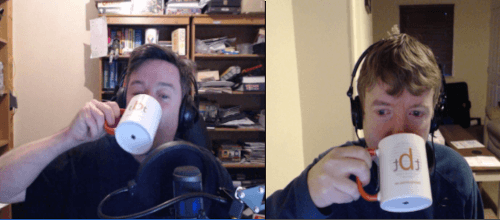
00:28 Wayne welcomes us to Series 7 Episode 6 from a mixed weather, early Spring type feel of a morning while Mark thinks the weather isn't going to be great for Paddy's Day. It doesn't really matters this year what with the Corona Virus outbreak and all the measures being taken to help delay the spread. Mark recommends Pizza and Red Wine as the only items that you need to panic buy. He goes on to mention the positive environmental outcome of lower NO2 concentrations over Northern Italy as a result of the lockdown there. The guys go on to discuss the fall in the stock market and the possibility a slowdown may ultimately be beneficial for us all and the planet, while also realising how hard it is to balance peoples' wellbeing, living standards and the environment.
07:51 Wayne brings the topic back around to Linux. Mark tells us of the OpenCovid 19 Initiative project undertaken by the Just One Giant Lab platform, which is hoping to find testing methodologies to detect the Coronavirus and hopefully a cure.
Mark goes on to tell us that he bought another /e/-phone, this time for his daughter. She is loving the interface, the features and the privacy aspect of the phone. The one drawback she finds with it is the search function as she doesn't find it very good at the moment. This leads to a conversation around the compromises we're willing to make.
15:46 Wayne tells us that he's switched back to Ubuntu Touch and relates his newest experiences with it while making the following points:
- Use a good USB cable
- Nextcloud users can save a lot of time by just signing up to their Nextcloud account in the Accounts section within System settings. Edit the script on the UBPorts documentation to remove all calendar syncing and to sync over your Nextcloud contacts
- Use the Jotit app for Nextcloud notes sync and the UBSync app for syncing folders to your Nextcloud instance
- The camera on the Nexus 5 takes very poor pictures. Here are some tips for better results. Go to the camera settings (swipe up from below) and set the pixel density to 8M 4:3. Hold the camera steady while taking a pic, and, most importantly, tap the section of the photograph that you want to have in focus. This forces the camera to focus on the selected area better than letting the camera automatically decide.
- Use Teleports for Telegram (no phone calls with telegram is a bit tough but not a deal breaker)
- Use AuthenticatorNG for 2FA accounts
- Use Podbird for podcasts
- Use Wakeit for wake on lan instances
- Use Sturm Reader for epubs
- To take a screenshot press the Vol up + Vol down keys together
- Install Libertine Tweak Tool to use firefox
Wayne is enjoying the fact that Nextcloud integration is getting better, being able to get ssh access to his phone is such a lovely feeling, copying files over and back with scp is just amazing, basically its a linux box.
26:52 Mark tells us of the steps he's been taking to try to get Unity of Command II working in Steam. He installed openSUSE Leap 15.1, installed the additional repositories and the proprietary Nvidia drivers, installed Steam and then installed the game. He set the game to log (by setting the Launch Options in Properties of the game to: PROTON_LOG=1 %command%) and it worked until it crashed, at which point it wouldn't work any more! Upon restarting the game he got the same error as he did in Ubuntu 20.04, so could no longer compare logs, as the log overwrites itself. While upgrading to openSUSE Tumbleweed didn't help, Mark compliments the openSUSE team on a seamless upgrade process.
32:04 Wayne tells us that he's been playing with FreeBSD 12.1 on a virtual machine. He tells us that BSDers have a saying "Linux users hate Windows, BSD users love linux". Mark has difficulty remembering the name of the Lumina Desktop, while also referring to a point Ben made in his last appearance on the show. Wayne is enjoying his brief time with BSD and is thinking of making an audio workstation using it.
39:51 Under the Hood - Wayne has a mountain of Under the Hoods, the first being curl cheat.sh /ls. All credit to Igor Chubin for another wonderful app!
Waynes next under the hood is explainshell.com, a site that allows you to write down a command-line to see the help text that matches each argument.
Wayne's last Under the Hood is a new search engine and that is the qwant search engine. He thinks their privacy policy is worthy of attention.
42:26 Mark's under the Hood is from Crowd Supply and it is an optically isolated Debounce HAT, which will be able to protect your Raspberry Pi from any electrical surges. Mark also mentions the HealthyPi v4 as an interesting project.
49:53 The guys talk about the latest Humble Bundles.
51:54 Irish saying of the Show: "Ní thuigim" or I do not understand.
We hope you enjoyed the show as much as we did making it!
The Binary Times - Series 7 Episode 5
Sun 1 Mar, 2020
Timeline companion
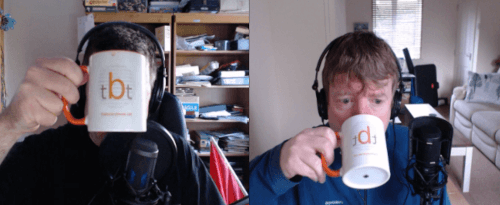
00:28 Wayne welcomes us to Series 7 Episode 5 on a windy stormy Jorge leap year day. The guys talk about Storm Jorge and storms in general for a bit. Wayne tells us that Greta Thunberg was in Bristol on the 28th February and this leads the guys to talk about Climate Change. Wayne recommends Greta Thunberg's speech at the Climate Action Summit as worth watching. The conversation inevitably turns to the Coronavirus and its effects on the globe.
17:56 The lads remember this is a Linux show, so Mark starts to tell us what he's been at Linuxy wise. He tells us he's upgraded his desktop from Ubuntu 16.04 to Ubuntu 18.04 and finally onto Ubuntu 20.04 and tells us how all that went. To upgrade to 20.04 from 18.04 he used the command sudo do-release-upgrade -m desktop -d. Wayne contemplates upgrading his Ubuntu MATE desktop to 20.04. Mark complains that Unity of Command II still won't work in Ubuntu when it's working in Arch.
33:49 Wayne tells us that Libre Planet is approaching and gives us a taster of what's happening there.
Wayne goes on to tell us he's been trying out Protonmail and Proton VPN. He tells us it all works quite nicely. Mark cautions that VPNs won't protect you from Malware, and Wayne advises user caution.
41:07 Wayne tells us of some hardware fun he had while in Ireland. He apologises to Conor of the Linux Lads for not making it to Dublin, due to the crazy stormy weather we've been having of late.
46:40 Under the Hood - Wayne tells us the 2G Raspberry Pi 4 Model B price will reduce to $35 and that the 1G model will be phased out. He goes on to tell us that Jon the Nice Guy Spriggs from the Admin Admin Podcast has released a video about Ansible and Inspec using Vagrant. Wayne's final Under the Hood is to take three deep breaths and let the chaos slide. Mark agrees with him.
51:38 Mark's Under the Hood is to listen to Tea Earl Grey Hot while watching Picard. The guys discuss the recent BBC's Panorama show "Amazon: What They Know About Us".
55:51 Irish Saying of the Show is "Is lá ana stoirmiúil é" or It is a very stormy day.
We hope you enjoy this show as much as we did making it!
The Binary Times - Series 7 Episode 4
Sun 16 Feb, 2020
Timeline companion

00:27 Wayne welcomes us to Season 7 Episode 4 from a windy and wet Bristol. Mark reports that Kilkishen is much the same, and our special guest Ben Klaasen tells us that Dublin suffers from the same affliction, that being Storm Dennis.
02:38 Mark tells us he's been continuing to test Kubuntu 20.04, and all is going well, he's looking forward to the release. Mark also noticed that LibreOffice 6.4 is now available as a snap, and recommends that people start using it, as it is an "essential release" as noted in the release video. Mark also notes that the Document Foundation released LibreOffice 6.4 on the 29th January, while the snap was released on the 11th and has been available since February 3rd on OpenSuse Tumbleweed's repositories , so Mark suggests that if the Document Foundation are encouraging people to use a Linux distribution that has the latest releases of LibreOffice then they should suggest OpenSuse Tumbleweed. Apart from that Mark has been watching videos of FOSDEM, at which point he suggests who better to talk about FOSDEM than Ben.
04:33 Ben tells us about FOSDEM. He decided on a whim to go and he's really delighted that he went. He notes that it's free to attend and run by volunteers. He describes that FOSDEM stands for the "Free and Open Source Developer's European Meetup", and that it has taken place on the Université Libre de Bruxelles du Solbosch Campus for the last twenty years. First impressions were a bit chaotic. He relates that the scale is hard to comprehend, but he gives us some statistics saying that there are 841 speakers, 873 events and 71 parallel tracks, all taking place more or less simultaneously across 35 rooms. Wow!
Ben goes on to tell us that FOSDEM is organized into a number of keynotes, with maintracks of Community and Ethics, Containers and Security, Databases, Freedom, History, the Internet and Miscellaneous! There are Developer Rooms helping developers to get together and solve problems, Lightning Talks on many subjects, and a part that he really loved, the stands. It stood out to him because while Corporates like RedHat and Suse were there, they weren't there in their glossy booths; it was more like a school fair, with representatives of the companies and projects standing behind school desks ready to answer whatever questions were thrown at them.
There was so much going on Ben found it frustrating at the start, just because there was so much going on, but once he made the realisation that that was the whole point of the conference and just to go with it, he found it amazing and would thoroughly recommend to anyone interested in Free and Open Source software to go there.
The topic changes to the male to female ratio that was quite apparently skewed. Ben describes a book by Marie Hicks, a University Professor of History who wrote a book called Programmed Inequality, which describes how Britain discarded their technological lead in computing when they discarded their women technologists. Mark tells us that there is a documentary about Kay McNulty (one of the original Eniac Programmers), available to view on the RTE player (which Mark isn't so sure is available outside of Ireland).
Wayne asks Ben what talks did he get to see and what tweaked his interest. Ben tells us he got to meet Mike Saunders, who's a proper gent by all accounts. He also got to see the State of OpenJDK, a review of the past year in the life of the OpenJDK Community given by Mark Reinhold. Another talk that caught his eye was The Hidden Early History of Unix by Warner Losh, describing the early history of Unix, funnily enough. He also talks about Generation Gaps by Liam Proven. This leads to a general discussion around programming. Ben goes on to tell us about What's up at Haiku, a talk given by Francois Revol, one of the developers of Haiku, on its current state. The guys have a general discussion around Haiku. Ben rattles off a few more talks to give us a feel for the scale of the event, namely BASICODE: the 8-bit programming API that crossed the Berlin Wall, Infrastructure testing, it's a real thing!, Correlation analysis in automated testing, Thunderbird in 2020 and Beyond, dqlite: High-availability SQLite, and Reinventing Home Directories. This leads to a more general discussion on having to relearn everything and building in complexity to solve problems for some but having the effect of pushing others out. Ben recommends another book by Cal Newport called Deep Work.
Before moving on to Under the Hood, Ben gives a shout out to Mike Saunders and the Document Foundation Group.
55:33 Under the Hood - Mark's Under the Hood is to listen to the latest series of Command Line Heroes, as the first two episodes of season 4 have been about the history of computers, with the first episode about Minicomputers, followed by Mainframes and soon to be followed by more interesting talks on hardware.
Ben's under the Hood is to recommend legacy code rocks. He also tells us that Firefox's Multi-Account Containers will now sync your container configuration and site assignments.
Wayne's Under the Hood is the How to Geek article on How to work with variables in Bash. He also mentions an Indiegogo campaign for NVMe ExpressCard Adapters for ThinkPads!
Irish saying of the show is "Tá grá mór agam ar an Binary Times" or I love the Binary Times!
We hope you enjoy this show as much as we did making it!
The Binary Times - Series 7 Episode 3
Sun 02 Feb, 2020
Timeline companion
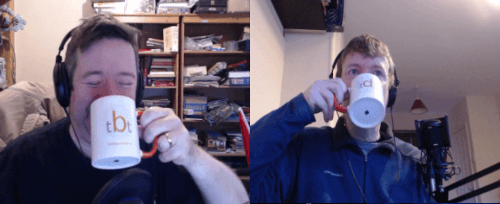
00:27 Wayne welcomes us to Season 7 Episode 3 from a wet and windy Bristol. It's wet and windy in Kilkishen too, as Mark relates that the wttr app is reporting much the same weather as he can see outside. It's a momentous day on the day they're recording, with many new beginnings happening, like it being the first day of spring and the first day of FOSDEM 2020. The guys plan a short show so they can watch the live streams.
03:11 Mark tells us what he's been up to. He tells us that his parents' PC was displaying a "system problem detected" error message that turned out to be nothing more than a prompt to upgrade from Linux Mint 19.2 to Linux Mint 19.3. Mark did the upgrade and it went very well, everything was plain sailing, but he voices his concerns regarding the fact that error messages like this are unnecessarily worrying for new or inexperienced users.
Mark goes on to talk about the upgrade of his parents' laptop from Linux Mint 18.3 to Linux Mint 19.3. This was a more involved process which first involved changing the display manager from mdm to lightdm, as Linux Mint changed display managers . He did this with these commands:
sudo apt install lightdm lightdm-settings slick-greeter
sudo apt remove --purge mdm mint-mdm-themes*
sudo dpkg-reconfigure lightdm
Reboot your machine, and once back at a terminal, input:
sudo apt update && sudo apt upgrade -y
Once fully updated, install Linux Mint's upgrade tool to upgrade from the older LTS to the newer LTS. You can do this as follows:
sudo apt install mintupgrade - to install the tool
mintupgrade check - to simulate an upgrade and check for any possible breakages.
mintupgrade download - to download the upgrade
mintupgrade upgrade - to do the upgrade
The guys discuss the number of steps involved in upgrading between LTSs.
Mark goes on to discuss how he put Zorin OS on a SSD for a colleague's parents' PC.
Wayne goes on to tell us how he's been upgrading all of his work's PCs to Windows 10 while also installing Ubuntu MATE on a few laptops.
14:40 Wayne goes on to tell us that Mike Saunders has upgraded MikeOS and provided a link to MikeOS playing "Stand By Me"!
15:53 Wayne goes on to thank Paul for a Vostro 3550 Laptop. In the spirit of paying it forward, which is Paul want, Wayne decided to try out some new distributions on the laptop to report back to everyone how it went. The first distro he tried was Pop!_OS (which he didn't really get on with) at which point Mark suggests Wayne should try Kubuntu 2020 next, which is Mark's re branding of Kubuntu 20.04.
Wayne goes on to tell us he also tried Regolith, a Free and Open Source Distribution based on Ubuntu 18.04 with the i3 Window Manager. He really likes it. He'll play around with it some more and recommends it if you want to give i3 a go.
23:59 The guys go on talk about the concept of "Pay it forward".
26:27 Wayne tells us about his MikroTik adventures. The guys talk about Network Security, and quickly lose their "pay it forward" feelings towards their fellows, not wanting to be the slowest in the hurd.
Wayne provides some of the links to the topics he's been covering with MikroTik, and these are as follows:
MikroTik VLAN and Bridge Configuration
MikroTik VLAN Routing Configuration with Manageable Switch
Mark mentions the Ubuntu Security Podcast as a good one to listen to as of late they cover other topics besides patches for security vulnerabilities like how to get into InfoSec
38:30 Wayne talks about Shotcut, a free and open source, cross-platform video editor.
40:37 Under the Hood - Mark tells us about Gardiner Bryan's attempt to create a Free and Open Source Game based on his frustration of Rocket League being discontinued for Linux. Mark plans to become a first rate games developer over the next couple of days and help create the best Open Source game EVA!!! There's no lack of ambition on this show!
44:21 Wayne's more understated Under the Hoods are as follows:
Use reader mode in Firefox!
Wayne's second under the hood is CTRL-L to clear the screen in a terminal
Wayne's gem of an under the hood is ip -c a which colourizes the command's output. He's even aliased ip to ip -c
49:48 Irish Saying of the Show is "Is maith liom ag caint le mo chairde" or I like to talk with my friends!
We hope you enjoy the show as much as we did making it!
The Binary Times - Series 7 Episode 2
Mon 20 Jan, 2020
Timeline companion
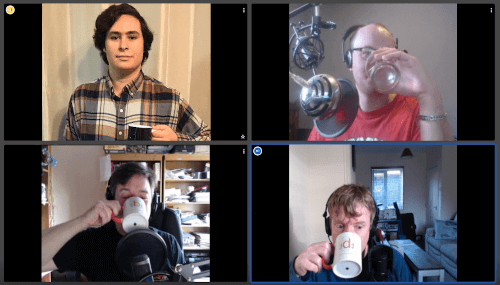
00:35 Wayne welcomes us to the second episode of Season 7 from a cool crisp Bristol. Mark regales us from a cool and crisp Kilkishen, perfect weather for some Hillwalking. We are joined today by Alex and William from Steam's very own Open Source Community.
01:53 Alex tells us what he's been at since he's last been on the show. While struggling through 2019, he got a new microphone and a new job. The Open Source Community has been on a bit of a hiatus, but now that Alex is settling into his new job he's hoping to start doing some events and the like. William tells us that something is on the cards but due to time constraints doesn't want to tell us just yet, expect to see an exciting announcement on the Open Source Community's announcement page soon! Alex promises it'll be something that the Steam Community will really like.
Alex goes on to tell us about what he's been doing with the Open Source Community of late.He's been republishing the Binary Times on Youtube, and announcing other news of interest, giving an example of the latest Vulkan 1.2 release. William is hoping that he will be able to be a lot more active in the Open Source Community in 2020. He also tells us that he's currently running a couple of Linux Desktops and servers and hopes to become more involved in the future too. The guys discuss the pros and cons of moving to Linux from Windows. Distros mentioned are Ubuntu, Sabayon, Zorin and Manjaro. Mark mentions Zorin Grid which is a new application from Zorin helping to bring advanced technology into companies, schools and organizations.
13:35 The conversation changes to what has Mark been at for the last while. Mark's been trying a brand new distro invented in his brain, Kubuntu 2020! He's actually been testing Kubuntu 20.04, which he thinks is turning out really nice so far. He's found a major problem with his Sony Vaio laptop and that is that it won't fit into the pouch of his laptop back!
Mark goes on to tell us that he thinks E support is really good.This brings the conversation around to Mobile computing, and the guys discuss their views on it. The Pinephone is something the guys are looking forward to. Various open stores like f-droid and yalp are mentioned also. Mark also mentions the E App store having a really nice way to rate the privacy and so forth of applications.
Alex goes on to tell us a bit about what Mike's up to. Unfortunately Mike was meant to be on the show, but he wasn't able to make it.
Alex also tells us about the Open Source Community's curator, a place where the Open Source Community promotes Open Source Games like Warfork and the like. Mark mentions Smokin Guns as a fun game based on the Quake 3 engine that's entirely open source.
28:51 Alex tells us all about ReactOS, a 32 bit binary compatible OS to Windows. There is work going on to bring about a 64 bit ReactOS also.
43:40 Under the Hood! Mark kicks off Under the Hood with a nod to Wireframe Magazine since this is the gaming special of the season. He mentions the fantastic article they did reviewing the decade. He also mentions they have a new book out, called Code the Classics Volume 1. He finally mentions that a number of Ukie hub crawls are taking place throughout the UK during January to March.
Alex has a tip on ReactOS and faking it to look like Windows - the first is a registry tweak - just change the registry entry to Windows 10. There's also a compatibility setting where you choose the properties of the OS you wish to choose.
Wayne has a few Under the Hoods. He's been doing a lot of networking lately, and he has this little hack to clean up the output from ip address show and that is ip a | grep inet. Noice!
Wayne's next one is that he's gone back to IRC and he has a link to a beginner's guide to IRC from fedora magazine. He also mentions Category 5 TV.
Wayne's final Under the Hood is related to his solo keys and an article on how to update them.
William's Under the Hood is to use Windows Virtual Machines on top of Linux.
Wayne goes on to recommend phonograph as a really good open source music player.
54:00 Irish Saying of the Show is "Ca bhfuil do bosca lon" or where is your lunch box!
The Binary Times - Series 7 Episode 1
Sun 4 Jan, 2020
Timeline companion

00:29 Wayne welcomes us to Series 7 Episode 1 by wondering what on Earth happened in the last decade. It's cloudy in Bristol, and cloudy and cold with rain in Kilkishen. Mark apologises for any background snoring noises as his dog blissfully sleeps on his lap.
02:40 Wayne asks Mark what he's been at, and Mark tells us he's been making the most of Christmas festivities. He tells us he received a present of a G213 logitech gaming keyboard and a G203 gaming mouse. Unfortunately changing the key colours aren't natively supported in Linux, but he found a python script by Sebi Time Waster on Github to help with the keyboard config and derEisele's addition of G203 mouse support and GUI using his script.
04:13 Mark asks Wayne what he's been at, after a little prompting. Wayne got the Automate the Boring Stuff 2nd Edition book for Christmas. With some fanfare, Wayne goes on to tell us he also got a Pinebook Pro and goes on to describe his experiences with it. Overall, he loves his new quiet robust device and looks forward to using it as a mobile computing device. Wayne provides a link to the fix for the trackpad issue he found.
24:39 The guys get onto their topic of conversation for the show, which is what the Binary Times is all about! Mark kicks it off by saying why he does the show is to talk about free software, free hardware and free culture because these things are important in modern life to retain control and bring power back to the people and away from other vested interests. Wayne agrees and goes on to say that the show encourages the use of free software, and he personally would be prepared to take the time to learn and maintain free software solutions so as not to be tied into proprietary services. Mark points out that privacy respecting services using free software like Kolab Now and ProtonMail do exist to replace these proprietary services. The guys discuss the dilemma of convenience versus freedoms.
Wayne's second point is to point out that there will never be advertisements on the Binary Times. Mark agrees. The guys discuss then the fact that they do this in their spare time and that the Patreon account is there to help them fund the whole enterprise.
Wayne's third point goes on to say that we don't track our listenership. While frustrating, this ties in with our own wish not to be tracked. Mark makes the point that this is why they value feedback so much.
Wayne's final point is that the show just represents two enthusiasts views on free software, hardware and culture of which neither two are experts and both are still learning. Mark agrees and thinks it mirrors life in that no matter how much you know, every one is still learning and the fact that two "normal" people can do a show like this should encourage others to get more involved in all this stuff too.
Wayne provides a couple of links to important information that can be found on the web, the first being Protect your Freedom from the Free Software Foundation. Mark plauds the fact that the Free Software Foundation has been mentioned as he sees it as the foundation of the free software that makes all this possible through the GPL. He goes on to say that free software is an enabler for creative people to be creative as it makes it possible to produce content for a cost that wouldn't have been possible in the past. Wayne tells us his current setup for the show consists of a Focusrite Sapphire 6 and an Audio Technica 2020 microphone for audio and a Lenovo T430 as his general purpose computer. Wayne does a quick search of ebay and finds a T430 available for under £80.
48:30 Under the Hood - Mark kicks off Under the Hood by describing the Four Essential Freedoms as defined by the Free Software Foundation and the Open Source Definition as defined by the Open Source Institute. Mark mentions VM Brasseur's talk at Freenode Live, Four Ways to spread the Four freedoms, as a good one to watch.
Wayne's under the Hood starts with a mention of the latest Humble Bundles, like the New Year, New You 2020 bundle. He goes on to talk about the latest prototyping board from the Pi-Hut. He finally mentions hacksplaining, a series of lessons on vulnerabilities explained well.
56:51 - Irish saying of the show is Athbhliain faoi mhaise duit or Happy New Year!
We hope you enjoy the show as much as we did making it!
Get your binary times apparel.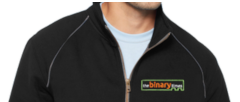
Many thanks to our supporters.
Subscribe to the show
Series 8 Episodes
Episode 9,
Episode 8,
Episode 7,
Episode 6,
Episode 5,
Episode 4,
Episode 3,
Episode 2,
Episode 1
Series 7 Episodes
Series 6 Episodes
Series 5 Episodes
Series 4 Episodes
Series 3 Episodes
Series 2 Episodes
Series 1 Episodes
About The Binary Times
The Binary Times show is created by Mark and Wayne, who just like using linux and open source software and want to spread the word.
GNU/Linux is free and open source and it is an excellent choice of operating system for our ever changing times.
This podcast is released fortnightly.
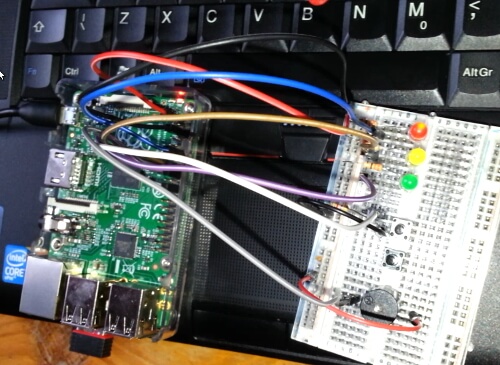
Electronic fun with the Raspberry Pi
This show aspires to touch on various aspects of GNU/Linux, with chat, musings, information, commands to help you get started or to advance within the GNU/Linux environment.
Special thanks
Many thanks to all recent supporters and contributors to The Binary Times Audiocast.
Thanks to Squid/Alex at the Steam Open Source Community for his support and donation.

